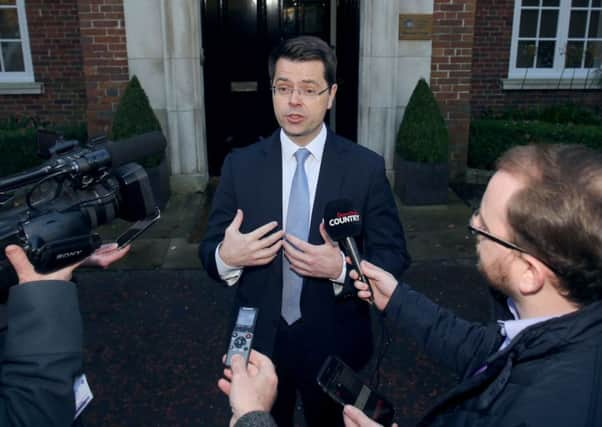Snap election seems inevitable after SF move


Northern Ireland Secretary James Brokenshire met politicians in Belfast in a last-ditch bid to avert a poll, but if the republican party maintains its stance then it is a certainty.
If Sinn Fein refuses to replace Martin McGuinness as deputy first minister by Monday then Mr Brokenshire is legally obliged to call an election, potentially for late February or early March.
Advertisement
Hide AdAdvertisement
Hide AdEarlier on Wednesday there had been confusion on whether Sinn Fein would enter negotiations with their long-time partners in government, the Democratic Unionists, before next week.
Health Minister Michelle O’Neill first said the party was “not interested” but party president Gerry Adams then said he was “always open for talks”.
Later Ms O’Neill clarified the party position: “Sinn Fein is always open to talks. We are the party of dialogue.”
But she added: “I see no basis for credible negotiations this side of the election.”
Advertisement
Hide AdAdvertisement
Hide AdDUP leader Arlene Foster has indicated she would be open to talks with Sinn Fein.
For his part, Mr Brokenshire said an election was a “high probability” but he pledged to keep striving for a resolution until all hope of a pre-poll deal was gone.
“My focus is on the here and now, on what can be achieved now, on what opportunities there are, what the potential may be to bring people together, rather than see people be driven further apart,” he said.
The Secretary of State warned that finding agreement would be harder on the other side of a divisive election.
Advertisement
Hide AdAdvertisement
Hide AdThe latest twists in a week of high drama at Stormont came as Theresa May made clear in the Commons that events in Belfast would not derail the Government’s timetable for leaving the European Union.
The Prime Minister rejected a challenge from Scottish National Party MP Angus Robertson to postpone the start of EU withdrawal talks under Article 50 because, he argued, Northern Ireland would be left without a voice in the process.
The collapse of the institutions was triggered by the resignation of Mr McGuinness on Monday.
The Sinn Fein veteran’s move, in protest at the DUP’s handling of a botched renewable energy scheme, forced Mrs Foster from her post as first minister.
Advertisement
Hide AdAdvertisement
Hide AdThe region faces the prospect of direct rule from Westminster being reintroduced if the fallout between the DUP and Sinn Fein cannot be resolved on the other side of an election.
While the looming collapse of power-sharing was triggered by the Renewable Heat Incentive (RHI) affair - a scandal that has left Stormont with a £490 million bill - other disputes between the two main parties have been reignited by the furore.
Mr Brokenshire and Irish foreign affairs minister Charlie Flanagan are holding separate bilateral meetings with Stormont parties this week in an effort to chart a way through the crisis.
Mr Flanagan, who will be in Belfast on Thursday, said: “I believe a divisive election campaign that will polarise public opinion in Northern Ireland will not be helpful at this time.”
Advertisement
Hide AdAdvertisement
Hide AdOn Tuesday evening, Mrs May and Irish premier Enda Kenny discussed the crisis on the phone. They pledged to work together to find a way through the political storm that has threatened devolution.
But Sinn Fein has already started planning to face the electorate and is holding a selection convention on Sunday.
Mrs Foster has announced plans for a public inquiry into the RHI affair while her party colleague, Economy Minister Simon Hamilton, has sent proposed measures to slash the £490 million bill to Sinn Fein Finance Minister Mairtin O Muilleor for consideration.
Sinn Fein has been sceptical of both DUP initiatives.